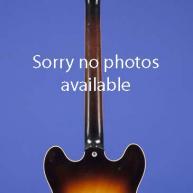Probably One of the First 100 Stratocasters Ever Made!
This 12 3/4-inch-wide "dream" guitar weighs 8.10 lbs. and has a nut width of 1 5/8 inches and a scale length of 25 1/2 inches. Solid ash body, contoured on back and lower bass bout, and finished in two-tone Sunburst (yellow to black). One-piece fretted maple neck, with a round and clubby profile, with 21 frets and black dot position markers. Small headstock with decal with Fender "spaghetti" logo in gold with black trim, "STRATOCASTER" in black beside it, "WITH SYNCHRONIZED TREMOLO" in black below it, and "ORIGINAL Contour Body" at the ball end of the headstock. Individual single-line "no-name" Kluson Deluxe tuners with oval metal buttons (stamped inside: "2356766 PAT APPLD"). Single circular string tree. Four-bolt neck plate with the serial number ("0273") between the top two screws. Three white Bakelite-covered black-bottom single-coil pickups with staggered polepieces and wonderfully balanced outputs of 4.92k, 4.95k, and 5.05k. Single-layer white Bakelite pickguard with eight screws. Three controls (one volume, two tone) plus three-way selector switch, all on treble side of the pickguard. White Bakelite knobs with gold lettering. Six-pivot bridge/vibrato unit with through-body stringing. The neck has a pencil mark of "TG[Tadeo Gomez]-6-54." The tremolo cavity has a pencil mark of "6/54." The potentiometers are all stamped "304 341" (Stackpole October 1953). This guitar is in exceptionally fine (9.00) condition. There is a small (1 inch) surface scratch to the black part of the Sunburst finish on the top of the guitar by the bass edge, a few small marks or 'dings' on the back and sides of the guitar -- but nothing really significant, a small (1/2 inch) scratch to the headstock, just affecting a few letters of "SYNCHRONIZED" in the decal, a few marks on the back of the neck, some playing wear to the fretboard, mainly confined to the first nine frets, and a little bit of playing wear on the edge of the fretboard. The original frets show some wear but they ceratinly have plenty of life left in them. One of the Bakelite tone knobs (the tone knob nearest the treble edge) has a small repaired crack. There is virtually no finish checking on this guitar and the finish is unfaded and not hazed or dulled out in any way. Overall, this is a spectacular playing, sounding and looking example, which has been really well looked after… a joy to hold, a joy to listen to… and a joy just look at… Complete with the original tremolo arm and white Bakelite tremolo cover with six screws. Also with a chrome snap-on bridge cover (which was not made available on this guitar until 1955). Housed in its original Fender brown form-fit "poodle" case with red plush shag lining (8.75).
"The Stratocaster was launched during 1954 [and was priced at $249.50, or $229.50 without vibrato]...The new Fender guitar was the first solidbody electric with three pickups [Gibson's electric-acoustic ES-5, introduced five years earlier, had been the overall first], meaning a range of fresh tones, and featured a new-design vibrato unit that provided pitch-bending and shimmering chordal effects. The new vibrato -- erroneously called a 'tremolo' by Fender and many others since -- was troublesome in development. But the result was the first self-contained vibrato unit: an adjustable bridge, a tailpiece, and a vibrato system, all in one. It wasn't a simple mechanism for the time, but a reasonably effective one...Fender's new vibrato had six bridge-pieces, one for each string, adjustable for height and length, which meant that the feel of the strings could be personalized and the guitar made more in tune with itself...The Strat came with a radically sleek, solid body, based on the outline of the 1951 Fender Precision Bass. Some musicians had complained to Fender that the sharp edge of the Telecaster's body was uncomfortable...so the Strat's body was contoured for the player's comfort. Also, it was finished in a yellow-to-black sunburst finish. Even the jack socket mounting was new, recessed in a stylish plate on the body face...the Fender Stratocaster looked like no other guitar around especially the flowing, sensual curves of that beautifully proportioned, timeless body. The Stratocaster's new-style pickguard complemented the lines perfectly, and the overall impression was of a guitar where all the components ideally suited one another. The Fender Stratocaster has since become the most popular, the most copied, the most desired, and very probably the most played solid electric guitar ever" (Tony Bacon, 50 Years of Fender, p. 18).
"Based on crosschecked information available today, production of the Stratocaster at a factory level probably began in March 1954. Asked about a date, GEORGE FULLERTON remembers that: 'It was no later than March 1954'…Shipments from the factory, however, did not take place until about two months later, as suggested by the circular then sent by FENDER SALES INC. to its dealers stipulating that 'SHIPMENTS ARE EXPECTED TO BEGIN MAY 15'…Although the Stratocaster was first advertised in April 1954, the FENDER sales force was probably keen to test its dealers' reaction (and take orders!) at the forthcoming NAMM show before committing itself to any production schedule. One the other hand, it certainly took some time as well for the factory to tool up and standardize manfacturing operations for the new gui9tar. Some Stratocasters were made in the first half of 1954, but they were basically intended for promotion, artist endorsement and also FENDER most daring dealers. According to FORREST WHITE, who was hired by Leo Fender in May 1954 as plant manager, full-scale production did not begin until October, when a batch of 100 guitars was first put on a single order by FENDER SALES INC. Yet, in July 1954, 200 unfinished bodies and 150 unfinished necks were already held in stock to meet initial orders. The earliest Stratocasters released in Spring of 1954 shared a few specific features which were later discontinued in the course of Summer. For instance, FENDER dropped the original control knobs after a few months and opted for slightly taller units with a different skirt. At the same time, the original pearl white bakelite material, initially used for the knobs and the pickup covers, was discarded because it often cracked. It was replaced by a 'mattish' and more durable white material, which remained in use until about 1956 before FENDER again changed in favour of white ABS plastic less prone to wearing off on the edges. The earliest pickup covers are charaqcterized by their rounded edges and glossier appearance. The serial number was moved from the vibrato backplate onto the neck plate by the end of June, after the Company certainly realized that backplates were not always kept screwed-on by players wishing to do a quick restringing" (A.R. Duchossoir, The Fender Stratocaster, p. 14).
Based upon the available information, including Werner's List, this example is probably one of the first 100 Stratocasters ever made -- and possibly one of the first fifty. The first Stratocasters in Werner's List have the serial numbers: 0035 (April 1954), 0065 (June 1954), 0087 (May 1954), 0105 (May 1954), 0123 (March 1954), 0136 (May 1954), 0146 (April 1954), 0155 (March 1954), 0156 (March 1954), 0159 (March 1954), 0166 (May 1954), 0176 (May 1954), 0189 (May 1954), 0193 (March 1954), 0197 (May 1954), 0202 (May 1954), and 0207 (May 1954) -- all of these numbered on the plastic tremolo cover. The first of the Stratocasters that were numbered on the neck plate are: 0240 (June 1954), 0246 (April 1954), 0287 (May 1954), and 0333 (July 1954). Historically, this is one of the most important guitars that we have ever offered for sale.
Translate:


